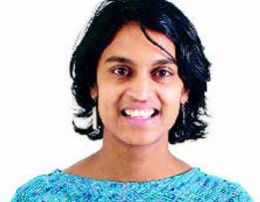Broadcaster Sinha speaks exclusively on the recent home birth of her new son.
ROADCASTER and life coach Shalini Sinha has spoken exclusively to Metro Éireann about her recent home birth.
Sinha (35) had her second child, Ishan, just over four weeks ago – in her sitting room in south Dublin.
The home birth, which was completely planned, proceeded naturally and Sinha received no painkillers. But the Canadian-born commentator insisted to Metro Éireann that she’s “no superhero” and is amazed that people consider homebirths as “brave”.
“If you have the opportunity to have a baby at home, then that must be the nicest place to have it, in that it’s your environment, it’s a supportive environment, and also you have a lot more control over having it the way you want,” said Sinha.
“Every birth has the opportunity to be a natural birth in the first instance, and it’s much more likely that it’s going to be like that, than to be something that needs intervention.”
Sinha, who has starred on RTÉ’s Mono, The Health Club and Celebrity Jigs ‘n’ Reels, said the home birth was planned through the Holles Street Community Midwives’ Programme, which she was full of praise for.
“Once you are dilated and in labour, then the midwife comes and stays with you throughout the labour,” she explained. “When you come to the final stage when you are fully dilated and pushing, a second midwife comes in for support.”
Pre- and post-pregnancy care is also provided, she added, and if complications arise during the birth, an ambulance will be summonsed.
Sinha, of Indian parentage, also enjoyed having a support network – her mother and two close friends – in the house during the birth, although her husband was the only non-medical person present at the delivery itself. She noted that support networks are particularly important for migrant women, who are without their childhood friends.
“It is painful,” admitted Sinha of her painkiller-free delivery. “Don’t let anyone tell you it’s not, but it’s painful for a reason. The pain is there only because we have nerve endings in our bodies to tell us what’s happening, and this is an incredibly extreme thing that’s happening in our bodies, so it’s felt at that level.
“With a fully natural birth, every fibre of your body is spent afterwards. Really, you’ve used every ounce of energy and you need time to recover. And you mightn’t be one of those women who’s out and rollerblading the next day, I don’t think anyone is, but you hear all these things.”
She added: “I know a lot of women opt for painkillers and epidurals, and I’m not trying to be any kind of superhero or martyr or anything, but I really do think that anaesthetics have an impact on the baby and the baby’s birth experience.”
Sinha said her first child, six-year-old Anish, had been delivered in hospital following necessary medical interventions and that, against her initial wishes, she had been given an epidural. However, she believes that interventions with the natural birthing process can have repercussions for new-borns in their initial months.
“With my first young fella, any time things got hard he’d just fall asleep, he would just switch off,” she recalled. “There’s something in and around an anaesthetic that just numbs you out and it took us quite a long time to get him through that numb-out behaviour.”
She said that although all babies are different, she believes her second son is particularly alert as a result of his natural birth.
“There is a habit in this society to underestimate what a human being experiences just because they are small or because they are young,” she said. “We all fully experience our births, and just because we move on it doesn’t mean it had no impact on us. That’s not to say that an epidural or other painkillers can always be avoided.”
Ishan was born on 29 December, weighing eight pounds, nine ounces. and is “a good healthy baby”. He underwent his paediatric appointment two days after the birth at Holles Street.
Sinha admitted surprise at reactions to her home birth. “People say to you ‘God you’re very brave to have a homebirth,’ as if it’s a dangerous or risky or frightening thing to do. I mean, they wouldn’t let you do it if it was risky or frightening.
“It’s an amazing experience. I certainly can’t think of anything men go through that is as physically and emotionally changing as birthing a child. It is the greatest physical, emotional and psychological challenge I can think of, and when you’ve done it I think it changes what you think is possible... Even after Ishan was born I still couldn’t believe I had done it. I couldn’t believe it. I didn’t think I had anything to do with it,” said Sinha, laughing.












